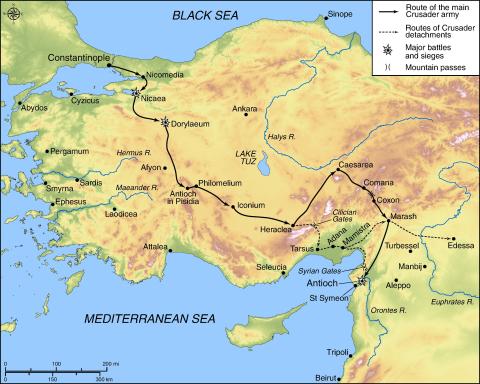The Road to Antioch
[4.10.2] Tunc veniēbāmus nōs, persequentēs inīquissimōs Turcōs cotīdiē fugientēs ante nōs. At illī venientēs ad cūncta castra sīve urbēs, fingentēs, et dēlūdentēs habitātōrēs terrārum illārum, dīcēbant: “Nōs dēvīcimus Chrīstiānōs omnēs, et superāvimus illōs, ita ut nūllus eōrum iam umquam audeat ērigere sē ante nōs; tantum permittite nōs intus intrāre.” Quī intrantēs spoliābant ecclēsiās et domōs et alia omnia, et dūcēbant equōs sēcum et asinōs et mūlōs, aurum et argentum et ea quae reperīre poterant. Adhūc quoque fīliōs Chrīstiānōrum sēcum tollēbant, et ārdēbant ac dēvastābant omnia convenientia sīve ūtilia, fugientēs et paventēs valdē ante faciem nostram.
[4.10.3] Nōs itaque persequēbāmur eōs per dēserta et inaquōsam et inhabitābilem terram, ex quā vix vīvī ēvāsimus vel exīvimus. Famēs vērō et sitis undique coartābant nōs, nihilque penitus nōbīs erat ad edendum, nisi forte, vellentēs et fricantēs spīcās manibus nostrīs—tālī cibō quam miserrimē vīvēbāmus. Illīc fuit mortua maxima pars nostrōrum equōrum, eō quod multī ex nostrīs mīlitibus remānsērunt peditēs; et prō pēnūriā equōrum, erant nōbīs bovēs locō caballōrum, et prō nimiā necessitāte succēdēbant nōbīs caprī et multōnēs ac canēs ad portandum.
notes
(July–August 1097) The retreating Turks plunder and burn anything useful to the advancing crusaders. Thus the crusaders are afflicted with starvation, and with a shortage of pack animals.
4.10.2
ad cūncta castra: "to all the fortified villages"; castrum in our text means a place that is inhabited and fortified.
Adhūc quoque: “still further.”
fīliōs Chrīstiānōrum sēcum tollēbant: an early instance of the Turkish practice of abducting Christian boys and raising them to be soldiers, as with the Janissaries of a later era.
4.10.3
dēsertā … terram: the arid basin around what is now Lake Tuz ("Salt Lake"), in central Anatolia.
vellentēs et fricantēs spīcās manibus nostrīs: perhaps an allusion to Luke 6.1, where the disciples take ears of grain on the Sabbath.
tālī cibō quam miserrimē vīvēbāmus: "we were living as miserably as possible on this kind of food."
nostrōrum equōrum: Either “of the horses belonging to our troops (nostri),” or “of our horses” (noster nostra nostrum); the second seems preferable, since the author immediately goes on to talk about multi ex nostris militibus.
eō quod: eo quod here = “with the result that” (ML).

